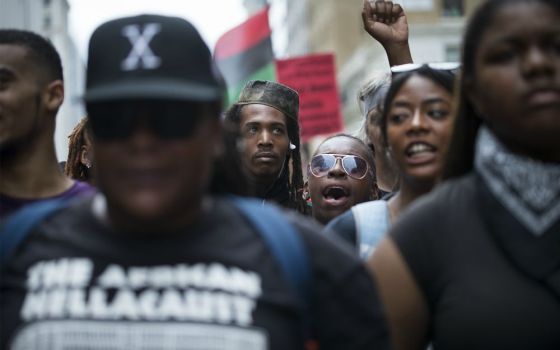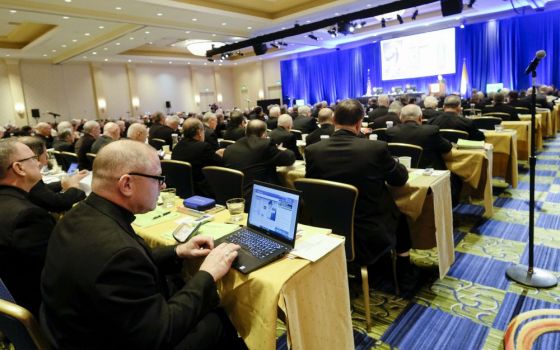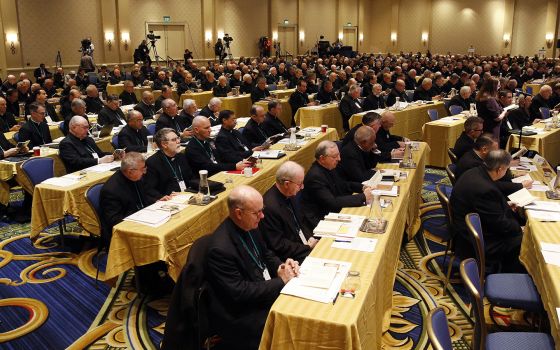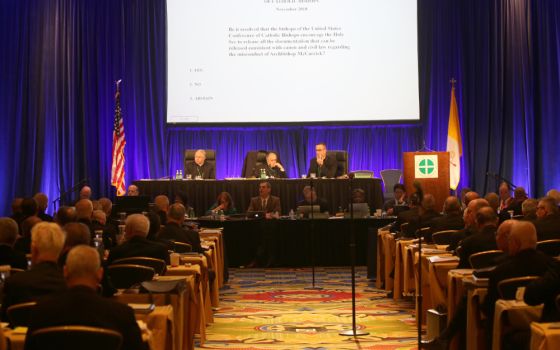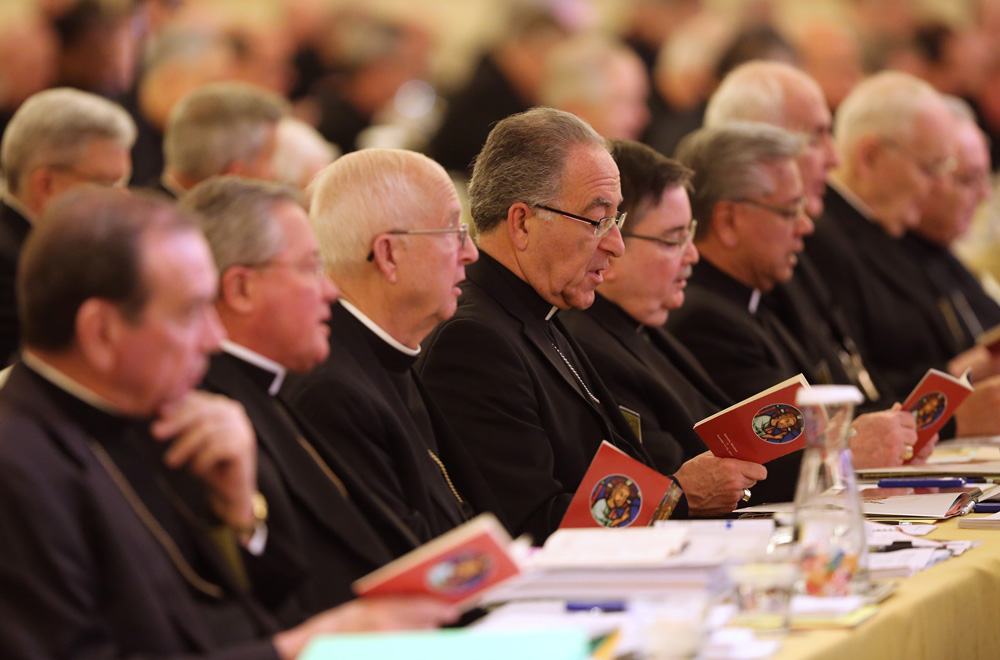
Prelates pray during the 2017 fall general assembly of the U.S. Conference of Catholic Bishops in Baltimore. Discussion and voting on concrete measures to address the abuse crisis and a day of spiritual discernment and prayer will top the agenda for the U.S. bishops when they meet Nov. 12-14 in Baltimore. (CNS/Bob Roller)
Greetings from Baltimore! This morning, we are waiting for the address by the papal nuncio, Archbishop Christophe Pierre, as well as the presidential address of Cardinal Daniel DiNardo. After that, the bishops will be engaged in spiritual discernment for the rest of the day.
One of the main issues the bishops will be discerning is how to respond to the clergy sex abuse mess, which requires diagnosing how they got to this point. While there is general agreement on many aspects of what caused the crisis, there are two meta-narratives about causation that are not complementary. Some argue that the core problem is the spread of homosexuality among the clergy, which has been made possible because of lousy moral theology and weak episcopal leadership.
Proponents of this meta-narrative ignore both expert and common opinion. The 2011 John Jay study indicated homosexuality is not a risk factor. Common sense would tell you that priests had access to the boys' room and not the girls' room and that in many of the years surveyed, there were not yet even altar girls. Interestingly, if you consult the news articles published at the time the John Jay study was published in 2011 (for example, this article by Carol Zimmerman published by the bishops' own news service, CNS), even conservative bishops like Archbishops Robert Carlson, Timothy Dolan and Allen Vigneron affirmed the findings and did not question them. The people complaining about the report were SNAP and other victims' advocacy groups, and their complaint was not that the report let gays off the hook.
The most obvious recent example of the "blame the gays" approach is Sandro Magister's column last week, in which he quoted from an essay by Cardinal Walter Brandmuller. It is difficult to estimate how bonkers Brandmuller has become, calling Josef Fuchs and Bernhard Haring "truly important heretics" and offering some quotes from St. Peter Damian about homosexuality that reflect the time and place in which they were uttered but which, cited today, are unworthy of anyone with a sixth-grade education. The aging cardinal should consult John Boswell's magisterial Christianity, Social Tolerance and Homosexuality: Gay People in Western Europe from the Beginning of the Christian Era to the Fourteenth Century before he opens his vulgar mouth again.
The best example of the other meta-narrative, which focuses on clericalism and the culture of the church, is found in an extraordinary lecture delivered last month by Austen Ivereigh at a symposium in Milwaukee. The entire talk was splendid but I wish to call attention to two passages that point to the kind of resistance Pope Francis is getting from the United States, and which Brandmuller applauds and Ivereigh decries, and why the U.S. bishops seem so unequal to the task of restoring trust in their own leadership. He writes:
This crisis, of course, is part of a larger one that goes well beyond this pontificate. The Church has been in tribulation for many years, because of the rapid expulsion of Christianity from western culture and law, and the growing distance and introversion of the Church. In too many cases the Church has refused humbly to accept the invitation of the Holy Spirit to discern and reform – to ask: how is the Holy Spirit asking us to change that we might evangelize in this new context? Instead of seeing the spiritual forces at work in our time, we have blamed secularization for our failure to evangelize. Rather than offer the person of Jesus Christ, we have focussed on ethics and ideas, and so end up offering truth at the expense of charity, or charity at the expense of truth. Rather than a body of joyful believers offering the transforming experience of Jesus's relationship with the Father of Love and Mercy, we become defensive dogmatists, or peddlers of banalities. Rather than God's holy faithful people, we become an arrogant, often abusive, institution, or one that looks like a benevolent charity rather than the source of truth.
And, later:
In Asunción, Paraguay, in July 2015 Francis noted: "How many times do we see evangelization as involving any number of strategies, tactics, maneuvers, techniques, as if we could convert people on the basis of our own arguments. Today the Lord says to us quite clearly: in the mentality of the Gospel, you do not convince people with arguments, strategies or tactics. You convince them by learning how to welcome them."
This Pelagianism of methods — evinced in a certain triumphalism in some apologetics — is one obstacle to evangelizing. But the greater obstacle in the past decades has been a Gnostic temptation to present Catholicism as a kind of ethical system or a moral code. Massimo Borghesi in the final chapter of The Mind of Pope Francis calls this "the moralistic drift that characterizes Catholicism in era of globalization", although I think his original Italian, desviazione etica, is easier to connect to Francis's critique in the Spanish version of Evangelii Gaudium of eticismo sin bondad, or heartless moralism. "It is not enough for our truth to be orthodox and our pastoral action to be efficient," Cardinal Bergoglio said in 2011. "Without the joy of beauty, truth turns cold and even pitiless and arrogant."
The phrase "triumphalism in some apologetics" brings more than one U.S. prelate to mind, eh? So, too, "peddlers of banalities." And, contrast the almost ritualistic bemoaning of secularization among the American hierarchy, even by the better ones, with Francis' very different response to the collapse of the Church of Trent.
Advertisement
Ivereigh's talk did not focus only on the sex abuse crisis but it fleshes out the correct meta-narrative about what caused the scandal. It was not so much the fact of clergy sex abuse that really shocked people as it was the way the bishops responded to that fact. Back in 2002 I wrote, "The crisis in the Catholic Church started as a sex scandal the way Watergate started as a burglary: What followed has become the real scandal. We all know that the sexual abuse of minors is horrific; but somehow the bishops did not react with horror. That is what truly shocks."
Put differently, the real cause of the scandal was clericalism which so warped the attitude of bishops that when confronted with the fact of clergy abusing a child, too many of them replied, "Poor Father." They sought to protect the institution, and their own reputation, rather than protect children.
Underneath almost every conversation the bishops have this week will be these competing theories about what caused the clergy sex abuse crisis. The first is a dodge, and if it is permitted to govern the bishops' response will wreck what little moral authority the bishops have left. Embracing the second theory and confronting the scourge of clericalism will not be accomplished in a single week. It will not be accomplished in the lifetime of the men gathered in Baltimore this week. But, if they do not start in earnest, then the church in the United States will wither and die.
[Michael Sean Winters covers the nexus of religion and politics for NCR.]
Editor's note: Don't miss out on Michael Sean Winters' latest: Sign up to receive free newsletters and we'll notify you when he publishes new Distinctly Catholic columns.





